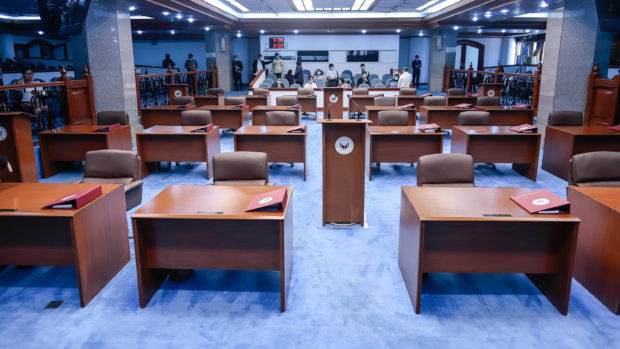
Senate Session Hall at the Philippine Senate in Pasay City, Metro Manila on March 23, 2020. Senate PRIB file photo / Henzberg Austria
MANILA, Philippines — The proposal to institutionalize the automatic income classification of local government units, which is among the priority measures of the Marcos administration, is now up for debate on the Senate floor.
Senator JV Ejercito, head of the local government panel, elevated and sponsored the consolidated version of the bill under Committee Report No. 64.
If passed into law, he said provinces, cities, and municipalities will be classified into six income classes “that will truly reflect their financial capability and position.”
The Secretary of Finance will also be given the authority to regularly reclassify the local governments every three years and review or revise the income ranges per income class, he added.
“Our substitute bill intends to resolve the predicament where the local government units are left with no recourse because of an outdated law on income classification,” Ejercito said.
Among the implications of the measure, he said, are the determination of local governments’ financial capability to take on developmental initiatives, the compensation adjustment for its personnel, and the determination of administrative aids, financial grants, and other forms of assistance to local governments.
“The income classification even serves as a basis for the minimum wage of domestic workers under the Kasambahay law, among other purposes,” the senator added.
A peek into the proposal shows the following income classifications:
Provinces
- First Class – Provinces with an average annual regular income of P1.5 billion and above
- Second Class – Provinces with an average annual regular income above P1.2 billion but below P1.5 billion
- Third Class – Provinces with an average annual regular income above P900 million but below P1.2 billion
- Fourth Class – Provinces with an average annual regular income above P600 million but below P900 million
- Fifth Class – Provinces with an average annual regular income above P300 million but below P600 million
- Sixth Class – Provinces with an average annual regular income below P300 million
Cities
- First Class – Cities with an average annual regular income of P1.3 billion and above
- Second Class – Cities with an average annual regular income above P1 billion but below P1.3 billion
- Third Class – Cities with an average annual regular income above P800 million but below P1 billion
- Fourth Class – Cities with an average annual regular income above P500 million but below P800 million
- Fifth Class – Cities with an average annual regular income above P300 million but below P500 million
- Sixth Class – Cities with an average annual regular income below P300 million
Municipalities
- First Class – Municipalities with an average annual regular income of P200 million and above
- Second Class – Municipalities with an average annual regular income above P160 million but below P200 million
- Third Class – Municipalities with an average annual regular income above P130 million but below P160 million
- Fourth Class – Municipalities with an average annual regular income above P90 million but below P130 million
- Fifth Class – Municipalities with an average annual regular income above P60 million but below P90 million
- Sixth Class – Municipalities with an average annual regular income below P60 million
According to Ejercito, the income reclassification of local governments every three years is “to synchronize with the terms of local elective officials.”
The senator also said a set income ceiling for provinces, cities, and municipalities will also ensure that Congress “equitably sets” the income ranges, not solely leaving the task to the discretion of the implementing agency.
“The bill also empowers the Secretary [of Finance] to classify a local government unit which is created before the regular reclassification. A newly created city, for instance, need not carry its income classification when it was still a municipality,” he said.
Ejercito further pointed to a “transitory provision” where no local government would be downgraded during the first income reclassification provided that they “not continue to fall below its income range during the next reclassification.”
“The measure ensures that no official or employee in the concerned local government unit shall suffer any diminution of salary and benefits only during the first income reclassification,” he added.
Senate Majority Leader Joel Villanueva said Ejercito’s brother, Senator Jinggoy Estrada, along with Senators Ramon Revilla Jr. and Sherwin Gatchalian, have co-sponsored the bill.
In March, the proposed law’s counterpart in the House of Representatives was unanimously approved on the third and final reading.
The bill, according to House Speaker Ferdinand Martin Romualdez, is among the 11 measures endorsed by the Legislative-Executive Development Advisory Council under President Ferdinand Marcos Jr.
READ: Congress vows passage of Maharlika, wage bills